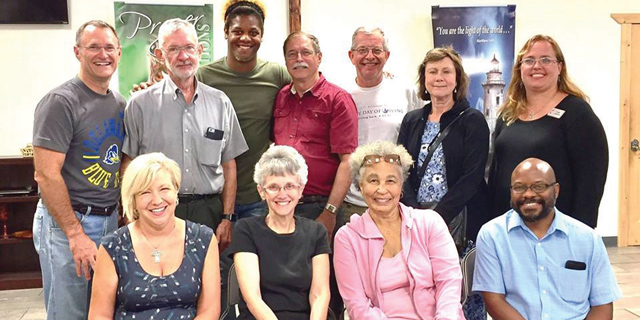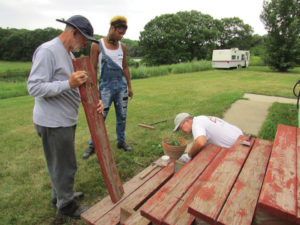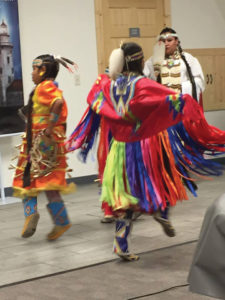 The Philadelphia Episcopal Area (Eastern PA and Peninsula-Delaware conferences) Spirit Lake Mission Team.
Top row, from left: Dr. Bo Gordy-Stith, Rev. Joe Tyson, Dion Williams (Deaf member), Bill Westbrook, Rev Fred Duncan, Lesley Tyson, Lynn Kohler (Deaf Interpreter). Bottom row, from left: Rev. Vicki Gordy-Stith, Bishop Peggy Johnson, Rev. Anita Powell, Rev Joe Archie.
The Philadelphia Episcopal Area (Eastern PA and Peninsula-Delaware conferences) Spirit Lake Mission Team.
Top row, from left: Dr. Bo Gordy-Stith, Rev. Joe Tyson, Dion Williams (Deaf member), Bill Westbrook, Rev Fred Duncan, Lesley Tyson, Lynn Kohler (Deaf Interpreter). Bottom row, from left: Rev. Vicki Gordy-Stith, Bishop Peggy Johnson, Rev. Anita Powell, Rev Joe Archie.
When I think of my recent trip to Spirit Lake Mission in North Dakota, Psalm 8 comes to mind:
O Lord, our Lord, how majestic is your name in all the earth. You have set your glory above the heavens. Out of the mouths of babes and infants, you have established strength because of your foes, to still the enemy and the avenger. When I look at your heavens, the work of your fingers, the moon and the stars which you have set in place,
What are people that you are mindful of them and the son of man that you care for them? Yet, you have made people a little lower than the heavenly beings, and crowned them with glory and honor. You have given people dominion over the works of your hands. You have put all things under their feet, all sheep and oxen, and also the beasts of the field, the birds of the heavens and the fish of the sea, and whatever passes along the paths of the seas. O Lord, our Lord, how majestic is your name is all the earth.
 Visit to Spirit Lake Tribal Community
Visit to Spirit Lake Tribal Community
Eleven of us from the Philadelphia Episcopal Area journeyed to Sheyene, ND, July 9-14, to spend a week in fellowship and ministry with Native American residents there. Our gracious hosts, the Rev. Mike and Libby Flowers, operate a mission near the Spirit Lake tribal community, where they house, feed and deploy volunteer work teams to do outreach ministry and home improvements. They also operate a daycare program for area children three days a week.
Our team did a bit of painting and carpentry on the homes of two Native residents, while also enjoying conversations with them. One evening we experienced a “culture night” when community members came and shared their music, dance, language, history and cultural values with us.
On our last day, we visited Fort Totten, a state museum and former army fort that was once the site of a Native American boarding school (from 1891 to 1935). There Native children and youth, taken from their families, were enculturated in the language, beliefs and ways of white Americans. Although the practice was considered “Christian” at the time, and many church groups engaged in this work, the boarding schools were typically abusive to families and to the self-identity of students.
How pejorative it was for white people to think that Native people were savages whose language, culture and ways of living needed to be “fixed.” “Kill the Indian and save the Man” was the popular slogan in that day, signifying a dark chapter in the history of the church and the nation. Sadly, too many of us continue to judge and blame others for God-given differences.
 Our team also visited a nature preserve and, under the vast sky, we saw sheer beauty among the hills and forests, along with bison and prairie dogs. The daily 10 PM sunset gave us ample time to observe God’s wondrous creation, resonating with the psalmist’s verse: “How majestic is your name in all the earth!”
Our team also visited a nature preserve and, under the vast sky, we saw sheer beauty among the hills and forests, along with bison and prairie dogs. The daily 10 PM sunset gave us ample time to observe God’s wondrous creation, resonating with the psalmist’s verse: “How majestic is your name in all the earth!”
Included on our team was a member of the Washington DC Deaf community. Dion Williams and his interpreter Lynn Kohler (a member of Epworth UMC in Rehoboth, DE) graced us to experience the gift of yet another culture: that of Deaf people. The children at the mission’s daycare program were enthralled with Dion’s sign language and the balloon toys he made for them. We also visited the nearby North Dakota School for the Deaf.
On this journey, I gained a greater appreciation of First Nation peoples and the love in their hearts. Our majestic God, the Great Spirit, is mindful of them; and they, in turn, teach us the sacredness of all of life and the interdependence of all God’s creation.
They value deeply their elders; and in exchange, elders teach younger generations their language, values and culture. They have great respect for the natural world and see themselves as a part of the creation that cares for the earth. They consider their “dominion of the earth” a sacred duty, not an enterprise to exploit, as many European settlers viewed our natural resources.
More to learn, much to do
There is much suffering and scant resources in many Native communities. Much of reservation life is isolating and lacking in socio-economic opportunities that can produce personal fulfillment. The discrimination Native peoples face from society at-large increases those burdens. As a result, they face alarmingly high rates of suicide and alcohol and drug addiction. There are critical programs led by Native people to address these concerns in culturally appropriate ways; but the need is overwhelming.
There is more to be learned and much more to be done by those of us called to seek justice and love mercy. As United Methodists we are indeed called to be in solidarity and ministry with the poor and oppressed.
We acknowledged the sins committed against our indigenous brothers and sisters during the “Act of Repentance” at our Annual Conference last year. But that is only the beginning. We must intentionally seek ways to be in community with Native American people, to right the wrongs done to them, and to learn from them the deep faith and rich cultural heritage that they bring to the Body of Christ.
I encourage you to consider going on a mission trip to Spirit Lake (www.spiritlakeministrycenter.org) soon. It is affordable, well-orchestrated, full of surprises and potentially life-changing. As you love and labor beneath God’s majestic heavens and that vast sky, you will not only see but become the works of God’s fingers. And, you will learn to walk the good road “as relatives to all that live.”
To close, I share a “Modern Tribal Prayer,” found at the Fort Totten museum, composed by a Native American person of faith:
Grandfather, Great Spirit, you have been always, and before you nothing has been. There is no one to pray to but you. The star nations all over the heavens are yours, and yours are the grasses of the earth. You are older than all need, older than all pain and prayer.
Grandfather, Great Spirit, look upon your children, the Spirit Lake Oyate, that they may face the winds and walk the good road to the day of quiet.
Grandfather, Great Spirit, fill us with the light, give us the light. Give us the strength to understand and eyes to see. Teach us to walk the soft earth as relatives to all that live. Help us, for without you we are nothing.
Note: Visit our conference Facebook or Flickr pages to see more photos of the Spirit Lake Mission Team experience.
